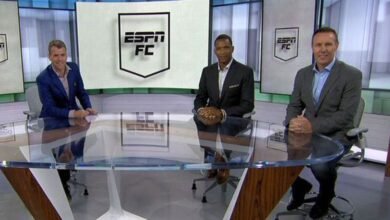Why Spain coach chose Alvarez over Messi, left out 16 stars

“I don’t drink, so I was perfectly sober,” Spain boss Luis de la Fuente insisted, and everyone laughed. It was a fairly humorous factor for a global coach to say; a fairly unusual factor too, but it surely most likely wanted to be mentioned. After all, being drunk appeared like nearly the one justification for what he had performed and it did not augur nicely for the long run.
Almost the primary job that former Spain U21 boss De la Fuente was given after he had taken over from Luis Enrique because the senior group supervisor on Dec. 8, whereas the World Cup was nonetheless happening with out them, was to vote for The Best FIFA males’s participant of 2022. And he voted for … Julian Alvarez.
Not eventual winner Lionel Messi, given his World Cup success, or France and PSG star Kylian Mbappe (who got here in second.) Not one in every of Real Madrid’s prime performers: Karim Benzema, Thibaut Courtois, or Vinicius Junior. He voted for Manchester City and Argentina ahead Alvarez.
De la Fuente did not even make any of that different lot his second or third selections. Instead he went for Alvarez, Borussia Dortmund’s Jude Bellingham and Real Madrid’s Luka Modric. What everybody needed to know was; why? And if that was who he chose as the perfect — no offence, and Alvarez is a world champion who scored 4 targets in Qatar — might he be trusted with selecting the perfect gamers when it got here to choosing a Spain squad?
– Stream on ESPN+: LaLiga, Bundesliga, extra (U.S.)
The reply to each questions got here on the similar time. On the day that De la Fuente named his first Spain squad, a information convention was held at Las Rozas, the HQ of the Spanish soccer federation (RFEF), 25km northwest of Madrid. The media got here to ask him concerning the males who would characterize Spain; in addition they got here to ask him what on earth he was considering when he declared Alvarez the best footballer on the planet. In reality, that received virtually extra consideration than the remainder of it — which could in itself be important, a mirrored image of actuality and the occasions we reside in. (And, sure, it is occurring right here too.)
The change of coach had occurred faster than anybody anticipated. It additionally did not fairly occur the way in which it was imagined to. Even outgoing coach Luis Enrique hadn’t anticipated it. So well-liked after the Seleccion‘s first sport on the World Cup, his departure ended up feeling inevitable by their fourth and ultimate match, as they crashed out on penalties within the spherical of 16 towards Morocco.
In reality, it had at all times appeared seemingly. Just not like that. Luis Enrique was inclined to see Qatar — or the summer season’s UEFA Nations League finals — as the tip of a cycle, or not less than a information to the place he would go subsequent. He had resisted calls to increase his contract previous to the event, not seeing the purpose, and his mid- to long-term plan was to return to membership soccer, most likely in England. At the very least, he was going to attend till after the World Cup earlier than he took a choice. Then he would select what got here subsequent.
Luis Enrique had his defenders and his critics too, and each had been radical at occasions. But the RFEF had been decided to get him to remain, describing him as the perfect supervisor out there; it had change into annoyed at his refusal to commit past Qatar. At that time, there was optimism; when Spain scored seven of their opening sport towards Costa Rica, all of the extra so. Even those that did not like him — and so they had been many — had come to the purpose the place they needed to admit that he was coach.
Had, although, is the phrase. Some had been ready for the prospect to say one thing very totally different. Ultimately, outcomes instructed, you would possibly assume. But there was one thing deeper too, one thing slightly extra private. That failure to get an settlement sooner left a sure stress which additionally instructed. Spain flew house with no choice made, but it surely did not take lengthy and it did not come from the place it was attributable to come from.
“I thought I would at least have to make a decision,” Luis Enrique admitted. Instead, the RFEF made it for him: the provide to resume was now not there and so they acted quick. He was changed by De la Fuente inside six days of Spain’s elimination. It was each shocking and never shocking in any respect: though Marcelino Garcia Toral had been the plain candidate, the indicators had been there.
There had been loads of individuals who had doubts about whether or not De la Fuente was the perfect man for the job, however he wasn’t one in every of them. The 61-year-old has by no means coached a top-flight membership, not even for one sport. The highest he reached was second-division Alaves in 2011 and he lasted lower than three months. But he had labored with the RFEF, an inside appointment. A former full-back, he had been Spain’s U19 after which U21 coach, and had led the U23s on the Olympics — posts he had occupied since 2013. Meaning, in his phrases, that he had been on prime of Spain’s greatest gamers for “the last 10 generations.”
“No one knows the present and future of Spanish football better than me,” he mentioned.
Better, they hoped, than he knew the remainder of the world’s gamers if he reckoned Alvarez was “The Best” of them.
And so it started. Well, kind of. De la Fuente had really been the Spain supervisor as soon as earlier than. When, simply earlier than the delayed Euro 2020, Spain’s senior squad had to enter isolation due to COVID-19 and the U21s performed the ultimate warm-up sport for them. Officially a full worldwide towards Lithuania on June 8, 2021 in Leganes, De la Fuente was the coach and Spain gained 4-0.
Being given the highest job for good was totally different and, on the face of it, the change was dramatic. Yet unpack it, and it doesn’t appear fairly such a leap. It is simply what it’s. A great instance is the primary and by far probably the most controversial factor De la Fuente did: name 36-year-old defender Sergio Ramos and inform him that he wouldn’t be returning to the squad.
Ramos learn that as ever quite than simply for this spherical of fixtures and wrote a protracted public letter hinting darkly that there might need been politics at play — the RFEF president Luis Rubiales doesn’t have the perfect relationship along with his former captain — and saying his retirement from worldwide soccer. To which De la Fuente replied: “I have the good habit of not airing private conversations in public”… The one that bade farewell is Sergio.”
It was a huge issue and yet, despite everything that Ramos has been, despite his form right now, and even Spain’s shortage at centre-back, it didn’t feel that big in purely sporting terms. Instead, this seemed to be more about the status of the man it affected than the football itself.
When the first squad was announced for the Euro 2024 qualifying games in Group A against Norway on March 25 and Scotland on March 28, 16 players who went to the 2022 World Cup were not in it. Which is a dramatic swing in just three months. It is also eloquent in itself, saying something of Spain’s moment, its reality, of Luis Enrique as well as De la Fuente: not least because actually you look at the list and it’s hard to find really significant fault with it. It is just what it is.
The 16 who didn’t make it were: Unai Simon, Cesar Azpilicueta, Eric Garcia, Pau Torres, Jordi Alba, Hugo Guillamon, Sergio Busquets, Carlos Soler, Marcos Llorente, Koke, Ferran Torres, Yeremy Pino, Marco Asensio, Pablo Sarabia and Ansu Fati. Plus Pedri, who is injured.
Ferran Torres’ agency tweeted a bitter response suggesting that people had “received what they needed,” but he’s not a regular at Barcelona. Busquets has retired from international football. And Simon is injured. How many of those are really glaring absentees? None.
In fact, there could have been more left out: it is striking to see that many changes and for none of them to be the second- and third-choice goalkeepers, in this case Robert Sanchez and David Raya. The one really big absence from the new squad might just be a goalkeeper too: Kepa Arrizabalaga was brought back, while David de Gea continues to be overlooked. And if you look at the list and ask if there are any really glaring inclusions, the answer may still be: none.
There have been call-ups for Joselu and, via injury to Gerard Moreno and Borja Iglesias. Iago Aspas, the best Spanish forward for a decade now, but a man Luis Enrique clearly wasn’t keen on, is back. Three strikers, all from Galicia. Real Madrid defender Nacho, the focal point of a campaign from the capital, in part because there was no one else, has rightly been included. Osasuna’s David Garcia has been called up. Real Sociedad’s outstanding Martin Zubimendi, a successor for Busquets, is there. And if Sevilla winger Bryan Gil’s inclusion surprises, there’s a link there.
Of the latest squad, Gil, Zubimendi, Dani Ceballos, Mikel Merino, Dani Olmo and Mikel Oyarzabal, (plus Pedri) all went to the Olympics with De la Fuente. This weekend we will find out how good they can be. But this is his team, his choice. Like Alvarez was for “The Best” awards.
“I simply fancied selecting him,” De la Fuente said. “No extra.”
Source link





